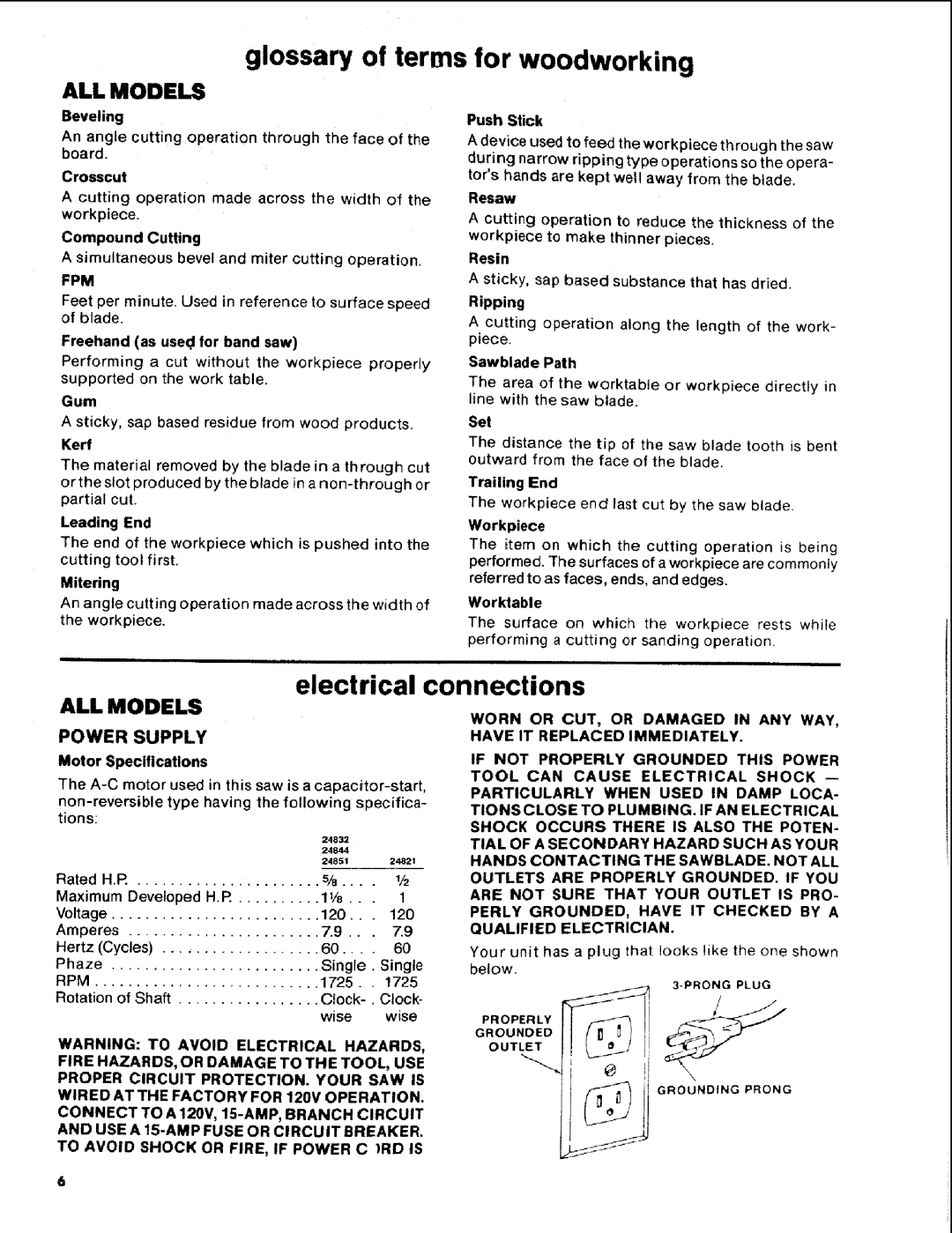
glossary of terms for woodworking
ALL MODELS
Beveling
An angle cutting operation through the face of the board,
Crosscut
A cutting operation made across the width of the workpiece.
Compound Cutting
A simultaneous bevel and miter cutting operation.
FPM
Feet per minute. Used in reference to surface speed of blade.
Freehand (as used for band saw)
Performing a cut without the workpiece properly supported on the work table.
Gum
A sticky, sap based residue from wood products.
Kerr
The material removed by the blade in a through cut or the slot produced by the blade in a
Leading End
The end of the workpiece which is pushed into the cutting tool first.
Mitering
An angle cutting operation made across the width of the workpiece.
Push Stick
A device used to feed the workpiece through the saw during narrow ripping type operations so the opera- tor's hands are kept well away from the blade.
Resaw
A cutting operation to reduce the thickness of the workpiece to make thinner pieces.
Resin
A sticky, sap based substance that has dried.
Ripping
A cutting operation along the length of the work- piece.
Sawblade Path
The area of the worktable or workpiece directly in line with the saw blade.
Set
The distance the tip of the saw blade tooth is bent outward from the face of the blade,
Trailing End
The workpiece end last cut by the saw blade.
Workpiece
The item on which the cutting operation is being performed. The surfaces of a workpiece are commonly referred to as faces, ends, and edges.
Worktable
The surface on which the workpiece rests while performing a cutting or sanding operation.
electrical connections
ALL MODELS
POWER SUPPLY
Motor Specifications
The
24832
|
| 24844 |
|
|
| 24851 | 24821 |
Rated H.P | 5/8... | 1/2 | |
Maximum | Developed H.R | 11/8.. | 1 |
Voltage | 120.. | 120 | |
Amperes | ....................... | 7.9,. | 7.9 |
Hertz (Cycles) | 60... | 60 | |
Phaze | Single | Single | |
RPM | 1725. | 1725 | |
Rotation | of Shaft | Clock- | Clock- |
|
| wise | wise |
WARNING: TO AVOID ELECTRICAL HAZARDS, FIRE HAZARDS, OR DAMAGE TO THE TOOL, USE PROPER CIRCUIT PROTECTION. YOUR SAW IS
WIRED AT THE FACTORY FOR 120V OPERATION.
CONNECT TO A 120V,
AND USE A
WORN OR CUT, OR DAMAGED IN ANY WAY,
HAVE IT REPLACED IMMEDIATELY.
IF NOT PROPERLY GROUNDED THIS POWER
TOOL CAN CAUSE ELECTRICAL SHOCK
PARTICULARLY WHEN USED IN DAMP LOCA-
TIONS CLOSE TO PLUMBING. IF AN ELECTRICAL SHOCK OCCURS THERE IS ALSO THE POTEN- TIAL OF A SECONDARY HAZARD SUCH AS YOUR HANDS CONTACTING THE SAWBLADE. NOT ALL OUTLETS ARE PROPERLY GROUNDED. IF YOU ARE NOT SURE THAT YOUR OUTLET IS PRO-
PERLY GROUNDED, HAVE IT CHECKED BY A QUALIFIED ELECTRICIAN.
Your unit has a plug that looks like the one shown below.
GROUNDED
PROPERLY
OUTLET
e
GROUNDING PRONG
